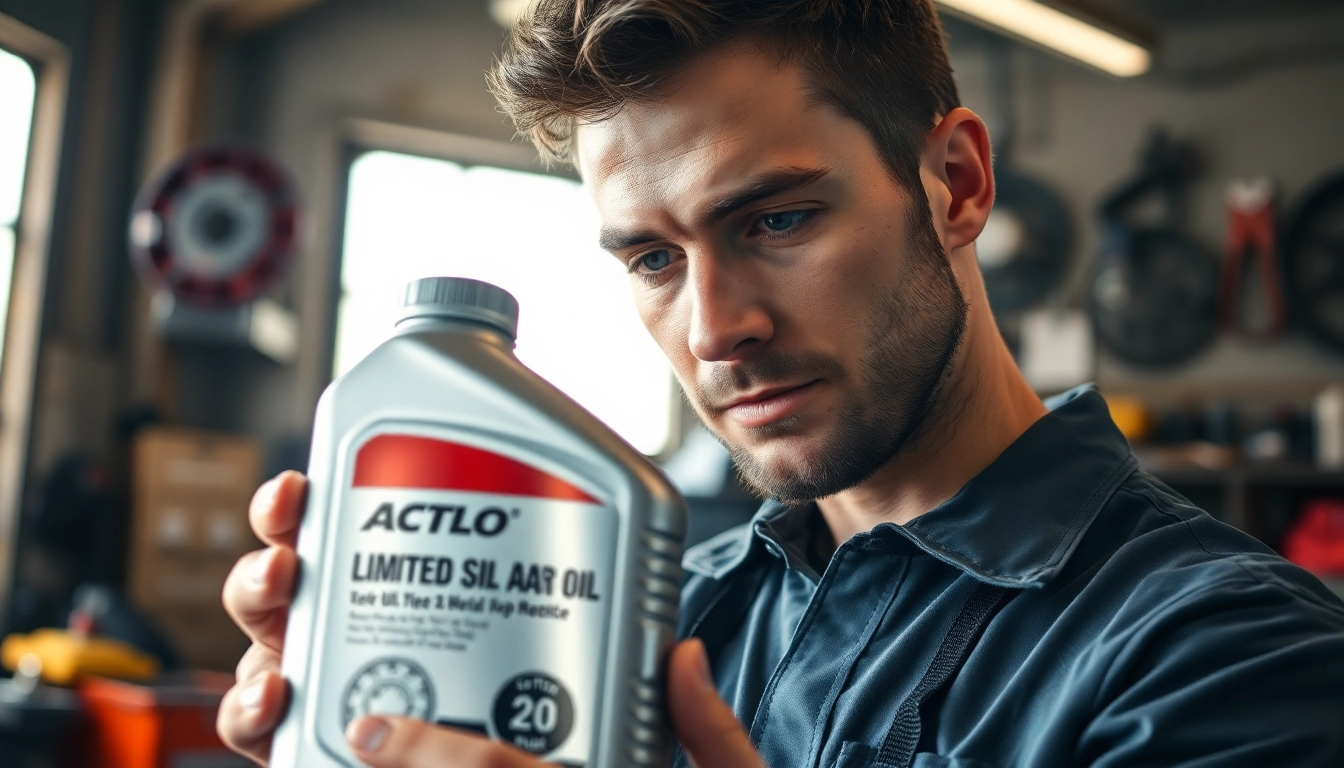
Understanding Limited Slip Gear Oil
What is Limited Slip Gear Oil?
Limited slip gear oil is a specially formulated lubricant designed for use in differentials, particularly those equipped with limited slip differentials (LSD). Unlike standard gear oils, which simply reduce friction between metal surfaces, limited slip gear oils contain additives that enhance the oil’s ability to manage torque and prevent excessive slippage between the gears. This is crucial for maintaining traction, handling, and overall performance in vehicles that may encounter varying conditions, such as moisture or rough terrain. A suitable limited slip gear oil is essential for safeguarding the gearbox components and optimizing vehicle responsiveness.
How Limited Slip Differentials Work
Limited slip differentials function by allowing slight variances in wheel speed while simultaneously distributing torque to both wheels, promoting better grip on the road. When one wheel begins to spin faster than the other—such as when driving on slippery surfaces—limited slip technology engages to redirect torque to the wheel with the most traction. This is accomplished through a set of clutch plates or gears within the differential, which apply resistance against the spinning wheel, thereby providing improved control. The role of limited slip gear oil becomes particularly pronounced here, as it not only lubricates but also enhances the engagement of these components during varying driving conditions.
Benefits of Using Limited Slip Gear Oil
There are numerous benefits associated with using limited slip gear oil in vehicles that require better traction and stability:
- Enhanced Traction: Limited slip gear oil helps provide better grip when navigating sharp turns or slippery surfaces, making it ideal for performance and off-road vehicles.
- Reduced Wear and Tear: The additives in limited slip gear oils reduce friction and heat buildup, contributing to a longer lifespan for differential components.
- Improved Handling: A properly lubricated LSD can significantly improve vehicle handling, resulting in a smoother driving experience.
- Noise Reduction: The right gear oil can also mitigate gear noise, leading to a quieter operation of the differential.
Selecting the Right Limited Slip Gear Oil
Oil Viscosity and Performance Specs
Viscosity is a critical factor when selecting limited slip gear oil. It refers to the oil’s resistance to flow at various temperatures. Generally, higher viscosity oils provide better lubrication and protection in high-stress situations, while lower viscosity oils flow better at low temperatures. It’s important to consult your vehicle’s owner manual to determine the manufacturer-recommended viscosity grade. Additionally, consider the operating environment; for example, extreme temperatures may necessitate a specific viscosity to ensure optimal performance.
Understanding API and GL Ratings
In addition to viscosity ratings, API (American Petroleum Institute) and GL (Gear Lubricant) ratings are crucial for selecting the appropriate limited slip gear oil. The API rating indicates the performance level of the oil, while GL ratings classify the oil according to its application in automotive gear systems. For limited slip differentials, look for oils rated GL-5, which signify that the oil is suitable for high-pressure applications and can handle the unique needs of LSDs. Always check for compatibility with your vehicle’s specifications to avoid costly damage.
Brand Recommendations and Comparisons
When it comes to choosing a brand of limited slip gear oil, several manufacturers are known for their high-quality products. Brands such as Mobil 1, Royal Purple, and AMSOIL have garnered reputations for offering products that meet or exceed API and GL ratings. It’s beneficial to compare the specifications, price points, and customer reviews of these products. Often, premium brands may provide superior performance and longevity, especially in demanding conditions.
Common Applications for Limited Slip Gear Oil
Performance Vehicles and Off-Road Applications
Limited slip gear oils are particularly beneficial for performance vehicles, including sports cars and racing vehicles, where power delivery and wheel traction are paramount for achieving optimal acceleration and handling. In off-road applications, limited slip gear oils ensure that even under extreme conditions—such as mud, sand, or rocky terrains—drivers maintain control over their vehicle by effectively distributing power to the wheels with the best grip. This functionality significantly enhances the off-road experience and safety.
Commercial vs. Recreational Use
While recreational users typically require limited slip gear oils for personal vehicles, commercial applications often demand higher durability and resistance to wear due to more frequent and intense use. Fleet vehicles, delivery trucks, and equipment used in construction or farming can benefit significantly from high-quality limited slip gear oil, ensuring optimal performance and reducing maintenance costs over time.
Impact on Overall Vehicle Performance
The use of limited slip gear oil can have a profound impact on a vehicle’s overall performance. Vehicles equipped with advanced drivetrains and limited slip differentials benefit from smoother operations, improved acceleration, and enhanced cornering abilities. Moreover, the reduction in friction also impacts fuel efficiency positively, as less power is lost to heat generation. Drivers who recognize the importance of quality gear oil contribute to the longevity and efficiency of their vehicles.
Installation and Maintenance Tips
How to Change Your Limited Slip Gear Oil
Changing your limited slip gear oil is vital for maintaining the health of your vehicle’s differential. Here is a step-by-step guide to ensure proper oil change:
- Gather Supplies: You’ll need the correct limited slip gear oil, a funnel, a drain pan, a socket wrench, and a torque wrench.
- Drain the Old Oil: Locate the drain plug underneath the differential. Use the socket wrench to remove it and allow the old oil to completely drain into the pan.
- Replace the Drain Plug: Once drained, replace the drain plug securely to prevent leaks.
- Fill with New Oil: Insert the funnel into the fill hole on the differential and pour in the appropriate amount of new limited slip gear oil, monitoring the level as you go.
- Check Levels: After filling, check the oil level using the dipstick (if available) or visually inspecting the fill hole.
- Seal and Clean Up: Ensure that all plugs are tight, clean up any spills, and dispose of the old oil in accordance with your local regulations.
Frequency of Oil Changes
The frequency of changing limited slip gear oil typically depends on driving conditions and usage. For standard driving conditions, changing the oil every 30,000 to 50,000 miles is often recommended. However, if you’re frequently operating in extreme conditions—such as heavy towing, off-road driving, or frequent stops and starts—consider changing the gear oil more frequently to ensure optimal performance and protection of your differential.
Signs of Gear Oil Neglect
Neglecting the maintenance of limited slip gear oil can lead to several indicators of deterioration and potential mechanical failure. Look out for:
- Unusual Noises: Grinding, whining, or clunking sounds from the differential may signify insufficient lubrication.
- Fluid Leaks: Any noticeable puddles or wet spots under your vehicle can indicate a leak that needs attention.
- Hot or Smelly Differentials: Excessive heat or a burning smell when operating can indicate that the oil is breaking down and needs replacing.
Frequently Asked Questions
Can I use regular gear oil instead?
Using regular gear oil in place of limited slip gear oil is generally not advisable. Standard gear oils lack the necessary friction-modifying additives that support the functionality of limited slip differentials, leading to potential slippage and performance issues. It’s always best to use oil specifically designed for LSD applications.
How to recognize the right viscosity?
Recognizing the right viscosity involves consulting your vehicle’s manual, which typically specifies the appropriate viscosity grade based on the operating conditions. Additionally, consider environmental factors that affect viscosity, such as climate—warmer climates might require different viscosity grades compared to cooler ones. Oil viscosity ratings such as 75W-90 or 80W-140 typically indicate suitable options for most vehicles.
What are the risks of using the wrong oil?
Utilizing the wrong type of oil can lead to a host of problems, including insufficient lubrication, increased friction, accelerated wear and tear, and ultimately, differential failure. This can also void warranties on vehicles and result in costly repairs. It is crucial to ensure that the oil you choose meets the specifications laid out by the manufacturer.







